Integrate External Ops Tools
Integrate Langfuse
What is Langfuse
Langfuse is an open-source LLM engineering platform that helps teams collaborate on debugging, analyzing, and iterating their applications.Introduction to Langfuse: https://langfuse.com/
How to Configure Langfuse
- Register and log in to Langfuse on the official website
- Create a project in Langfuse. After logging in, click New on the homepage to create your own project. The project will be used to associate with applications in Dify for data monitoring.
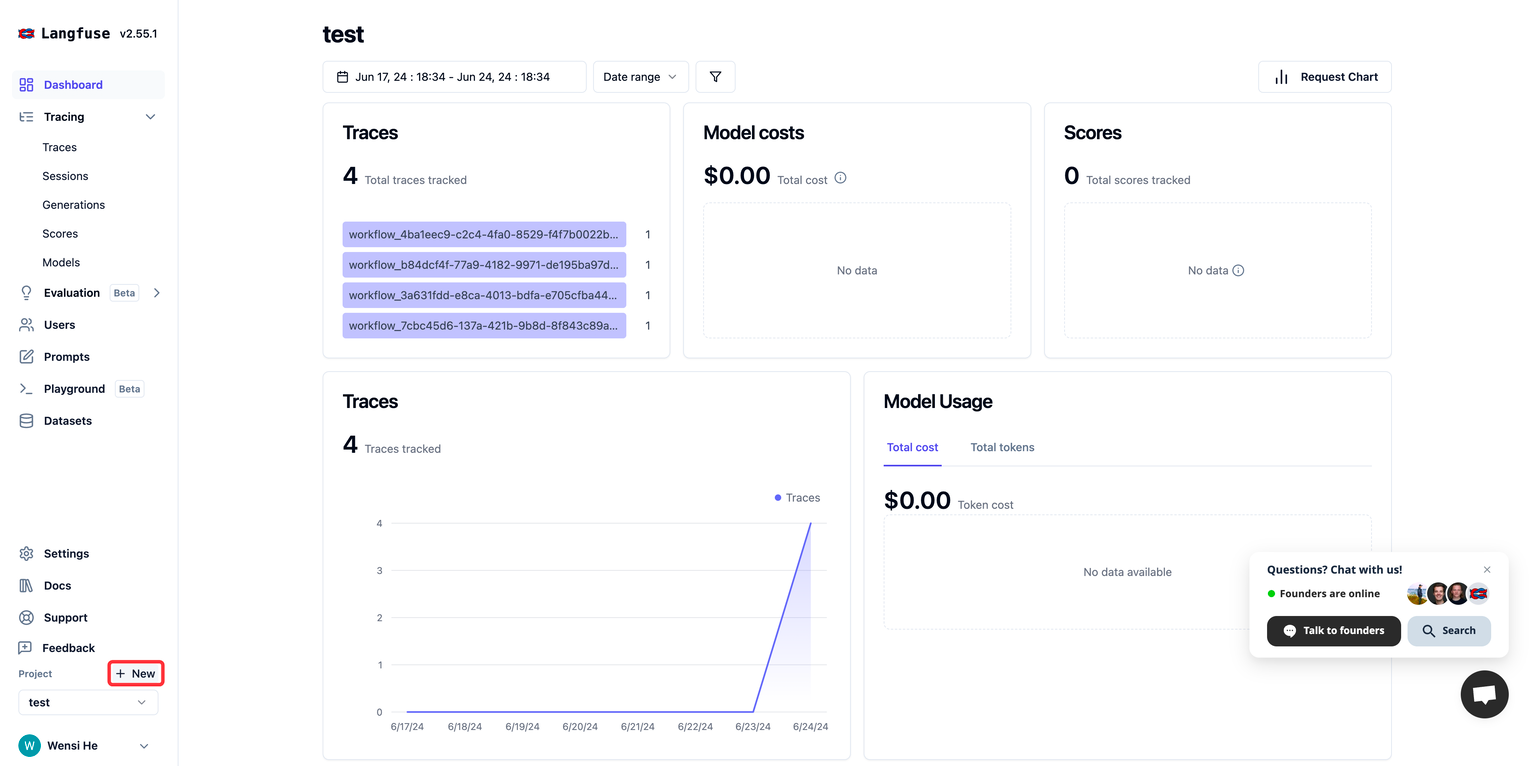 Edit a name for the project.
Edit a name for the project.
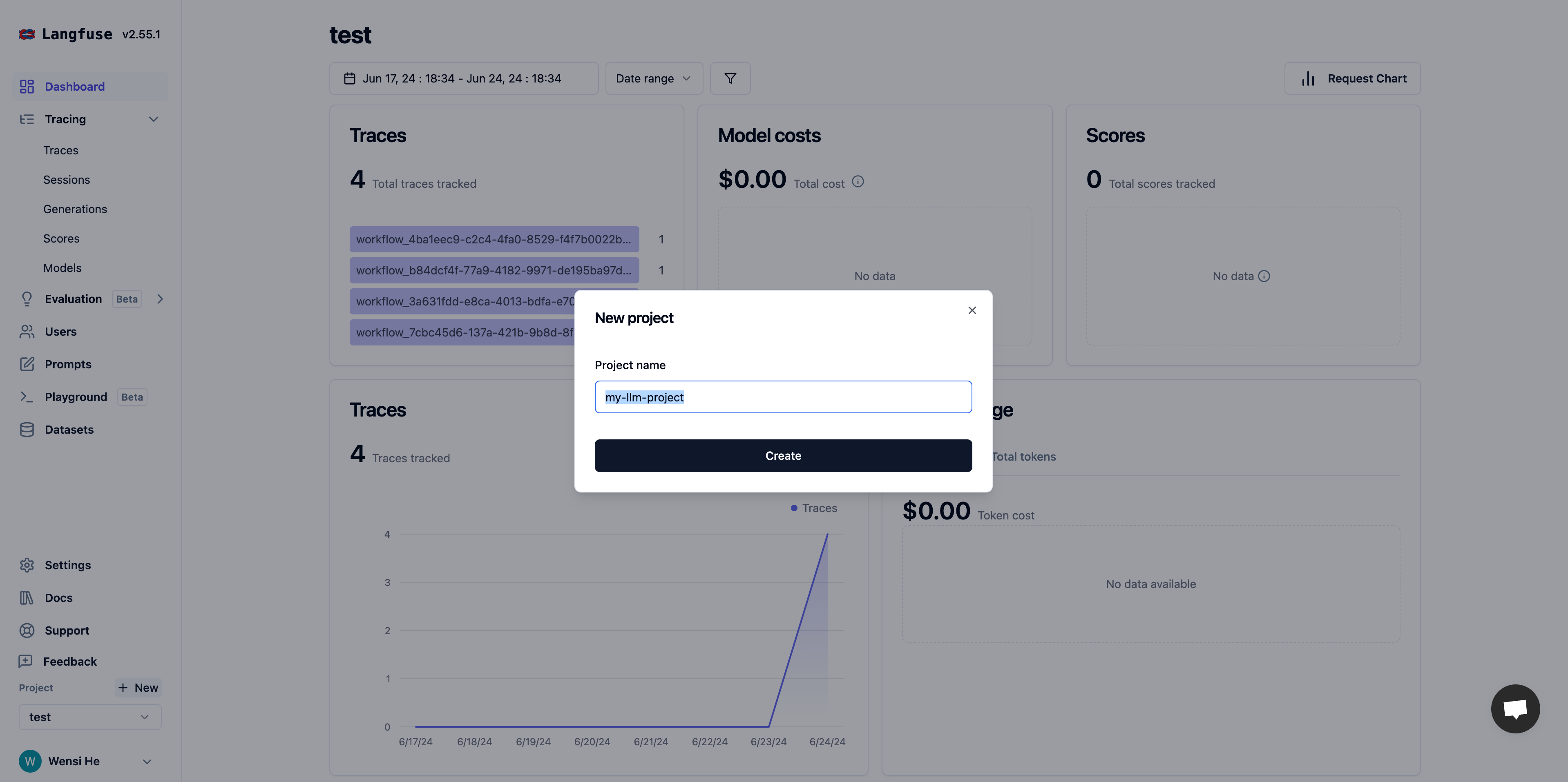
- Create project API credentials. In the left sidebar of the project, click Settings to open the settings.
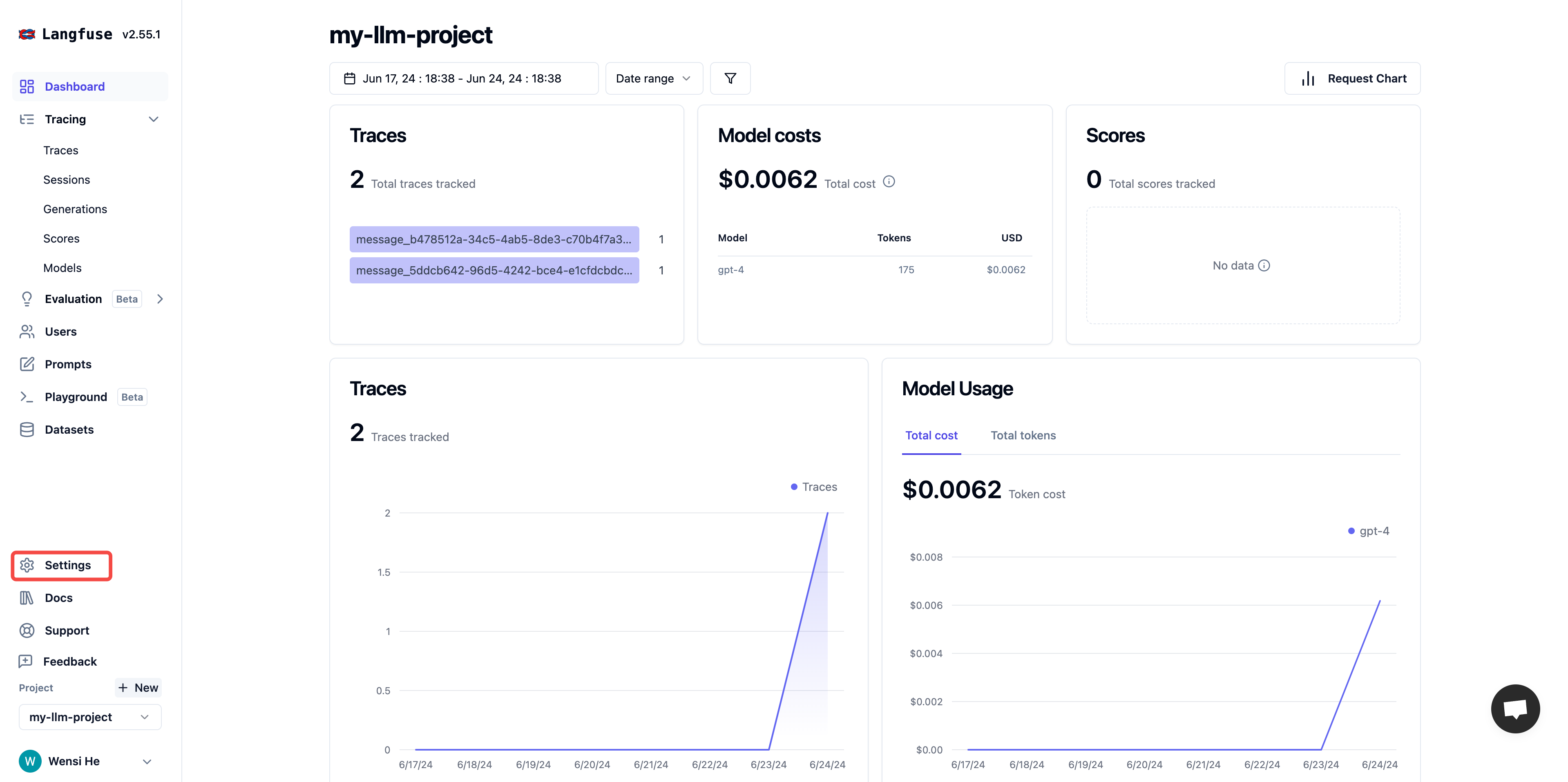 In Settings, click Create API Keys to create project API credentials.
In Settings, click Create API Keys to create project API credentials.
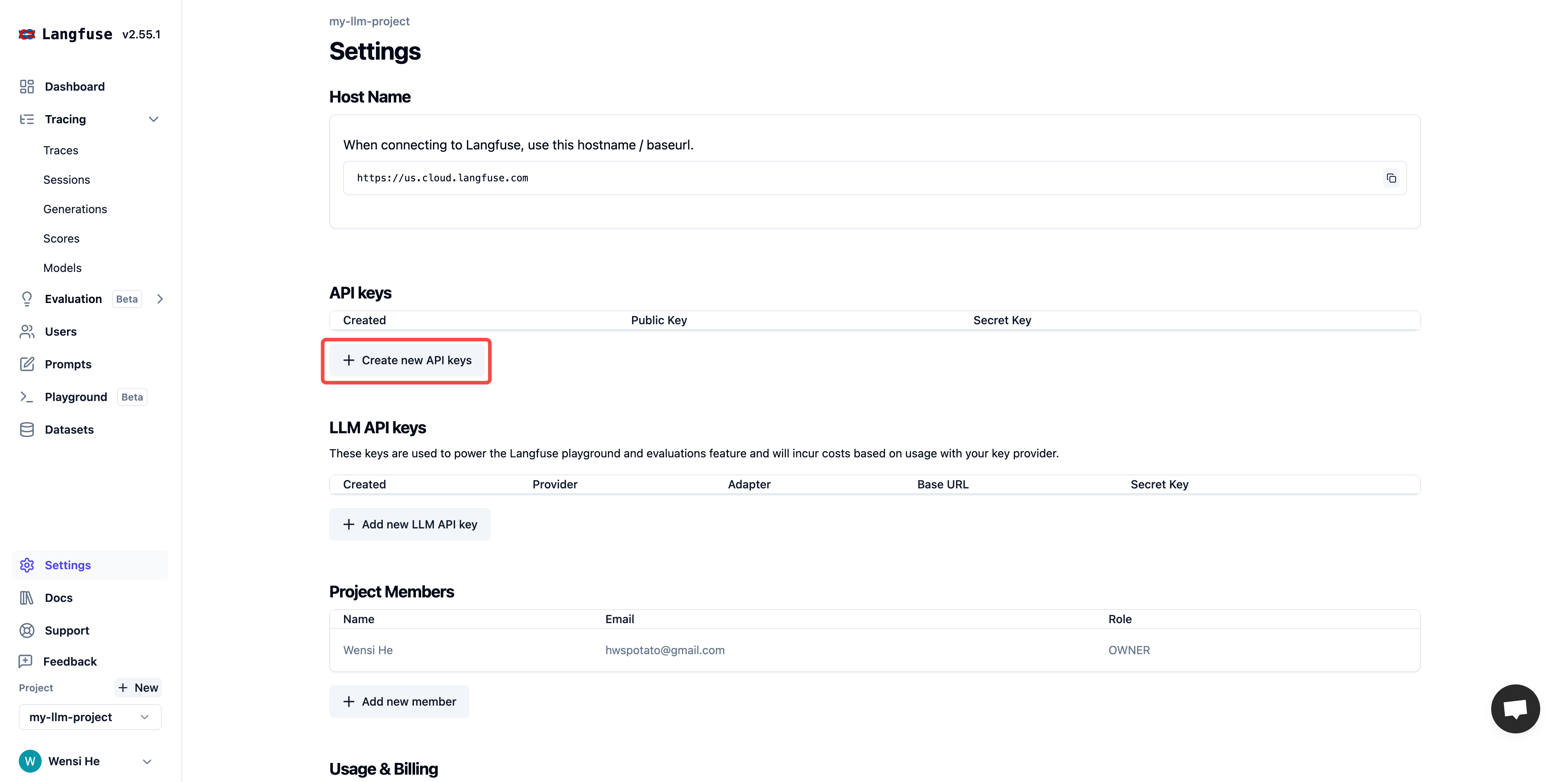 Copy and save the Secret Key, Public Key, and Host.
Copy and save the Secret Key, Public Key, and Host.
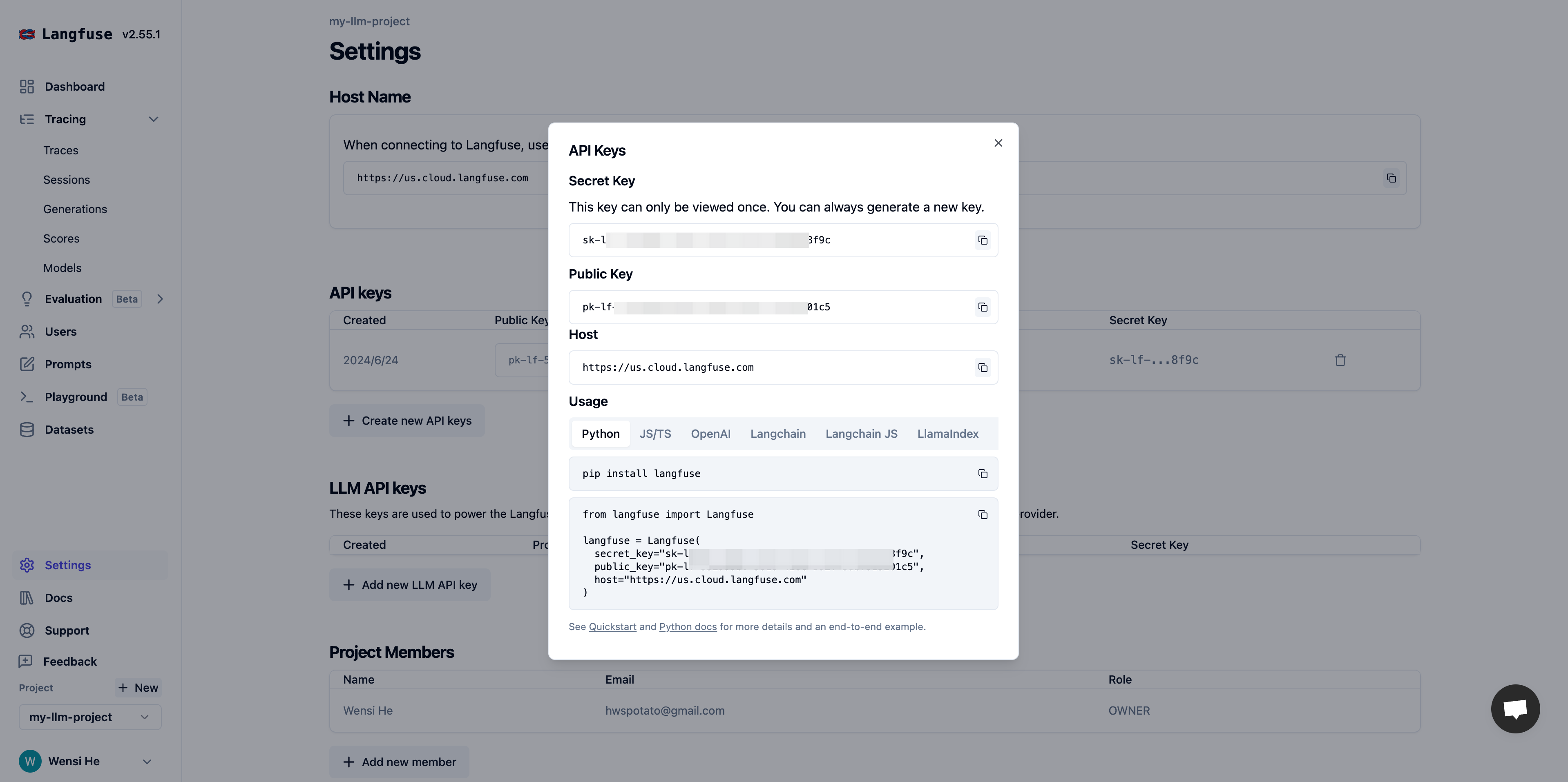
- Configure Langfuse in Dify. Open the application you need to monitor, open Monitoring in the side menu, and select Tracing app performance on the page.
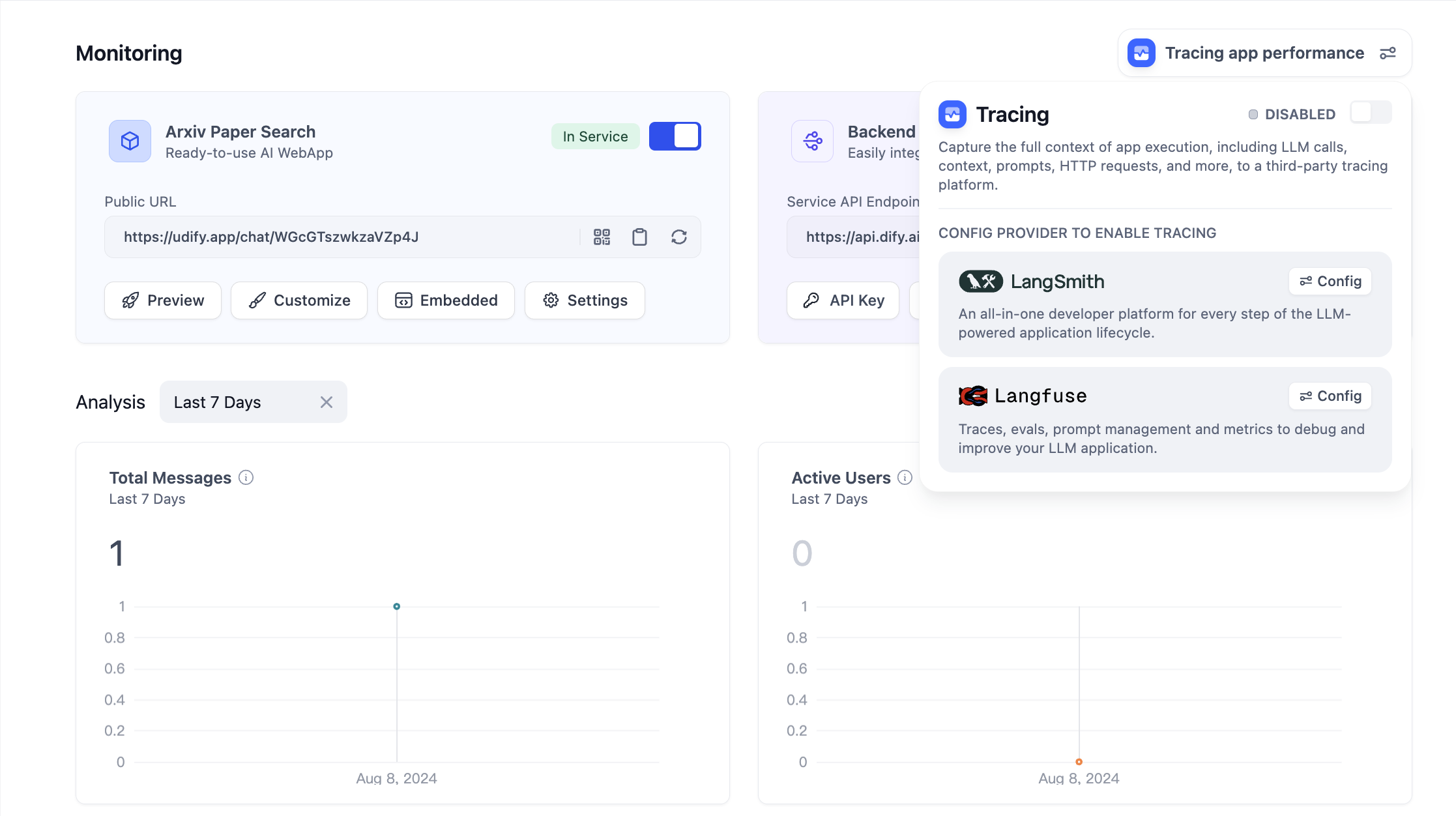 After clicking configure, paste the Secret Key, Public Key, Host created in Langfuse into the configuration and save.
After clicking configure, paste the Secret Key, Public Key, Host created in Langfuse into the configuration and save.
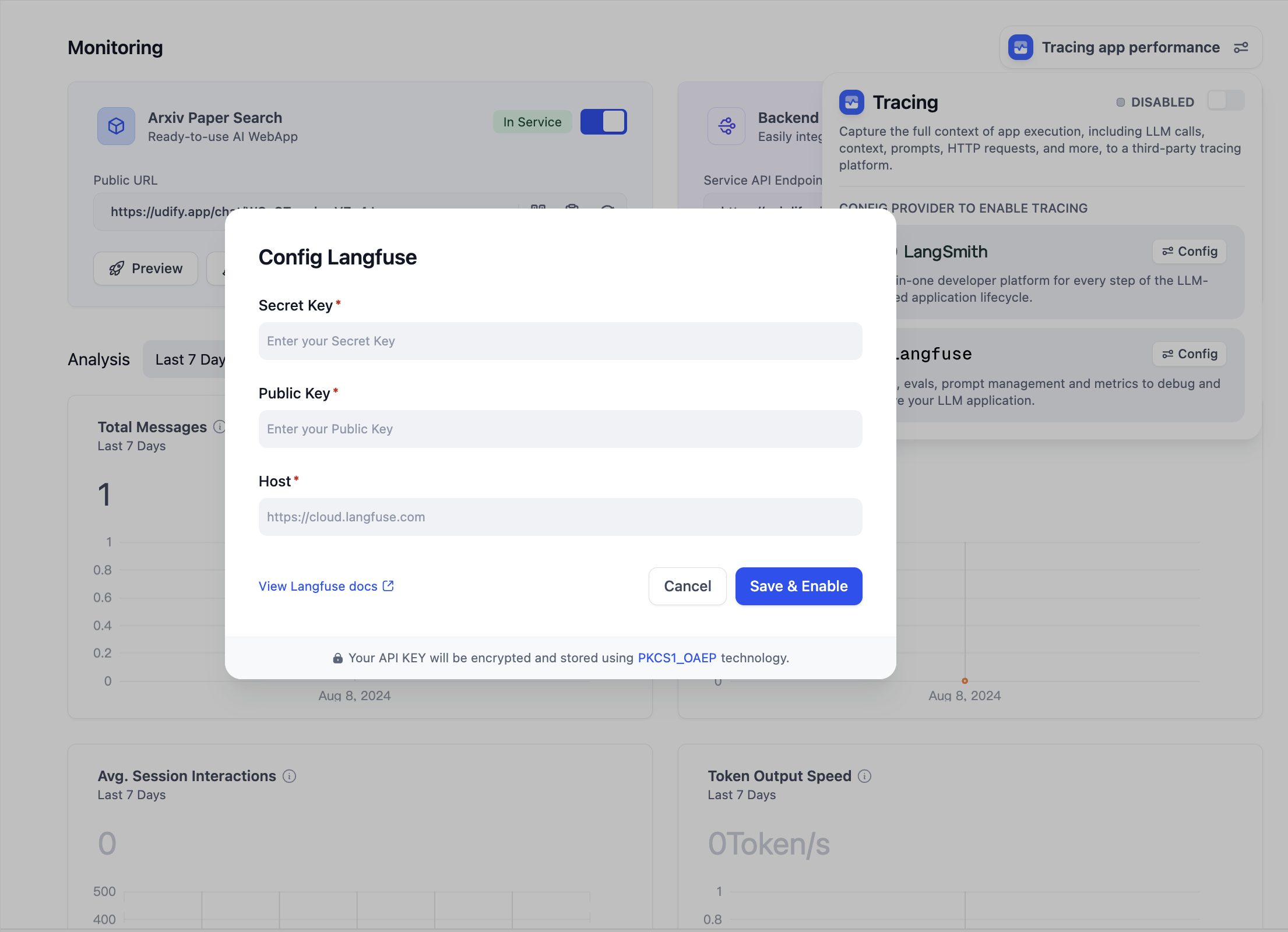 Once successfully saved, you can view the status on the current page. If it shows as started, it is being monitored.
Once successfully saved, you can view the status on the current page. If it shows as started, it is being monitored.
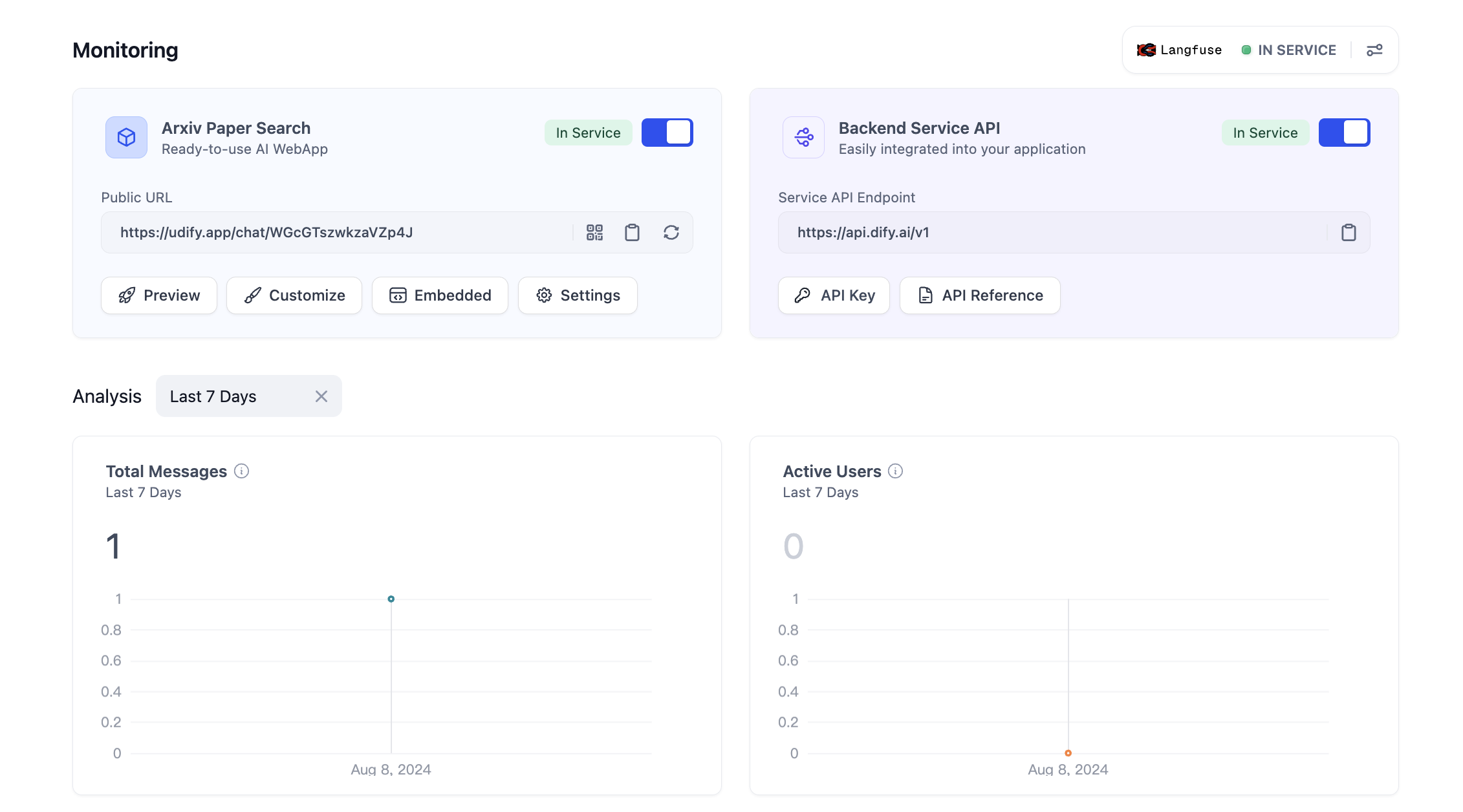
Viewing Monitoring Data in Langfuse
After configuration, debugging or production data of the application in Dify can be viewed in Langfuse.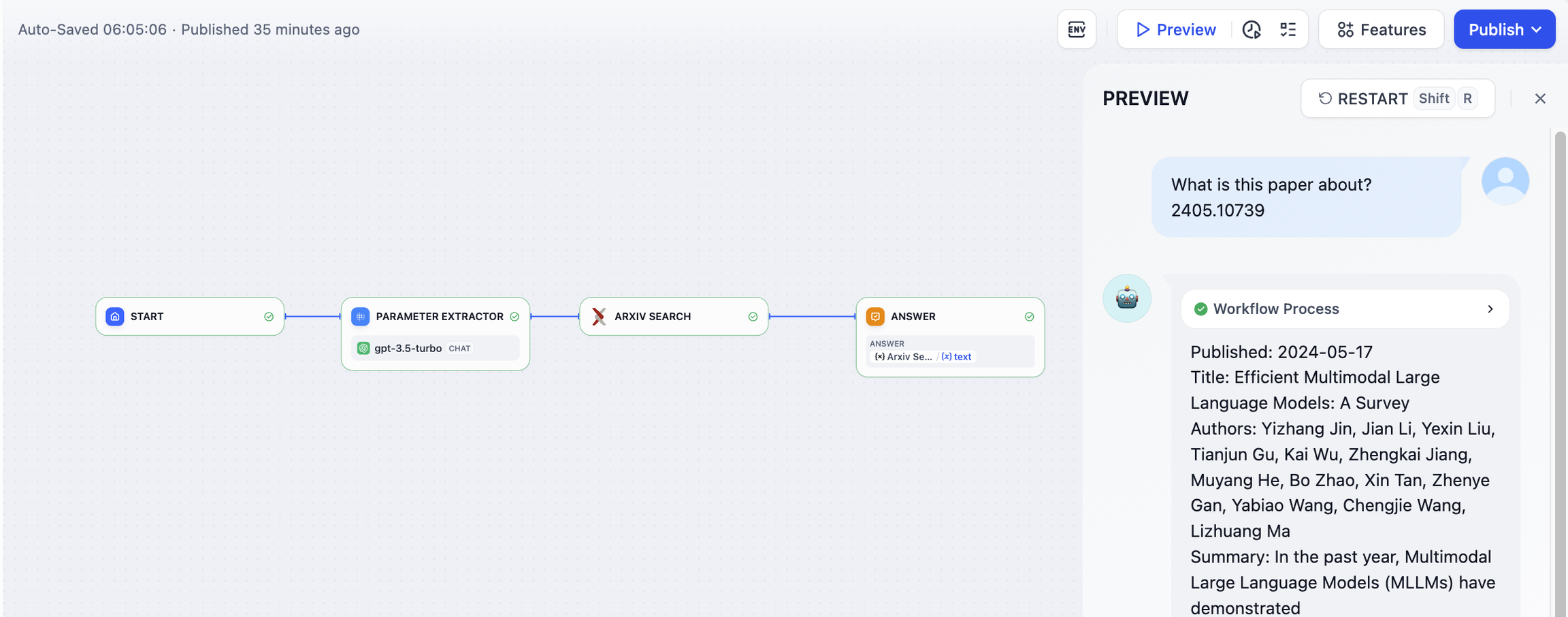
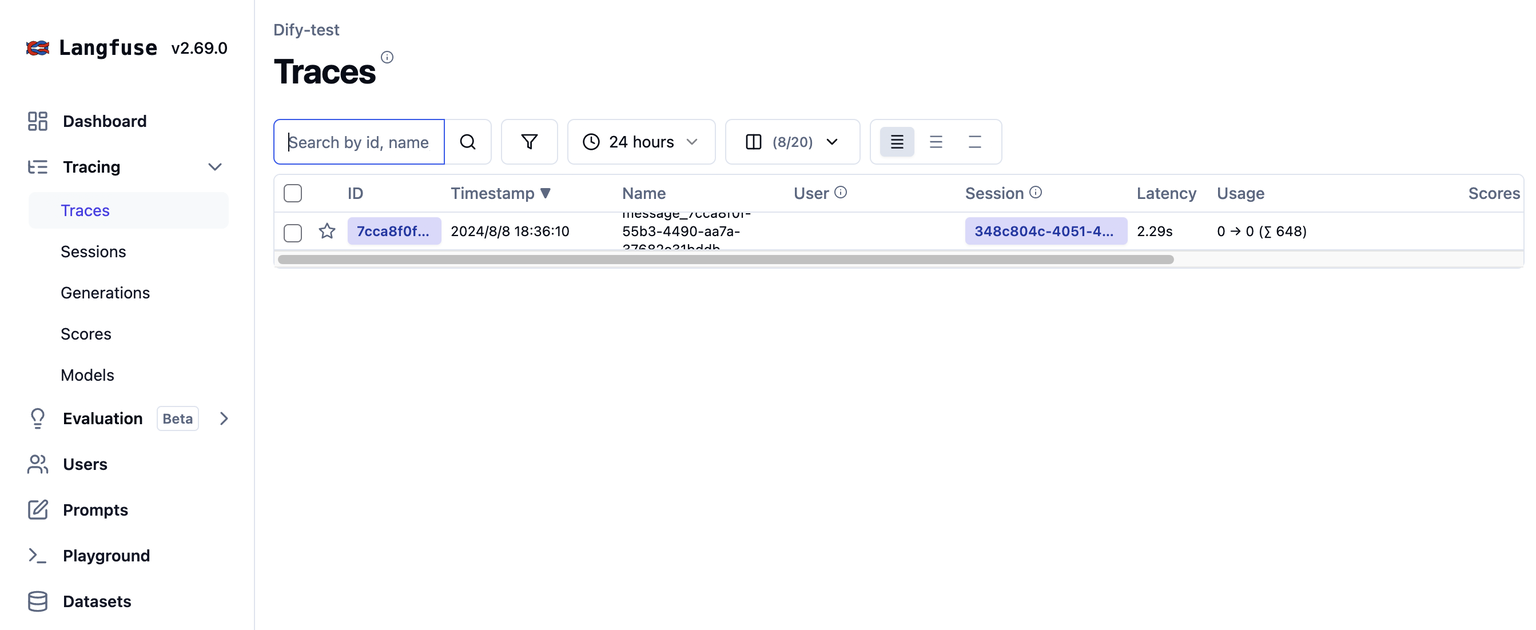
List of monitoring data
Trace the information of Workflow and Chatflow
Tracing workflow and chatflow| Workflow | LangFuse Trace |
|---|---|
| workflow_app_log_id/workflow_run_id | id |
| user_session_id | user_id |
| workflow_ | name |
| start_time | start_time |
| end_time | end_time |
| inputs | input |
| outputs | output |
| Model token consumption | usage |
| metadata | metadata |
| error | level |
| error | status_message |
| [workflow] | tags |
| [“message”, conversation_mode] | session_id |
| conversion_id | parent_observation_id |
- workflow_id - Unique ID of Workflow
- conversation_id - Conversation ID
- workflow_run_id - Workflow ID of this runtime
- tenant_id - Tenant ID
- elapsed_time - Elapsed time at this runtime
- status - Runtime status
- version - Workflow version
- total_tokens - Total token used at this runtime
- file_list - List of files processed
- triggered_from - Source that triggered this runtime
- workflow_run_inputs - Input of this workflow
- workflow_run_outputs - Output of this workflow
- error - Error Message
- query - Queries used at runtime
- workflow_app_log_id - Workflow Application Log ID
- message_id - Relevant Message ID
- start_time - Start time of this runtime
- end_time - End time of this runtime
- workflow node executions - Workflow node runtime information
- Metadata
- workflow_id - Unique ID of Workflow
- conversation_id - Conversation ID
- workflow_run_id - Workflow ID of this runtime
- tenant_id - Tenant ID
- elapsed_time - Elapsed time at this runtime
- status - Operational state
- version - Workflow version
- total_tokens - Total token used at this runtime
- file_list - List of files processed
- triggered_from - Source that triggered this runtime
Message Trace Info
For trace llm conversation| Message | LangFuse Generation/Trace |
|---|---|
| message_id | id |
| user_session_id | user_id |
| message_ | name |
| start_time | start_time |
| end_time | end_time |
| inputs | input |
| outputs | output |
| Model token consumption | usage |
| metadata | metadata |
| error | level |
| error | status_message |
| [“message”, conversation_mode] | tags |
| conversation_id | session_id |
| conversion_id | parent_observation_id |
- message_id - Message ID
- message_data - Message data
- user_session_id - Session ID for user
- conversation_model - Conversation model
- message_tokens - Message tokens
- answer_tokens - Answer Tokens
- total_tokens - Total Tokens from Message and Answer
- error - Error Message
- inputs - Input data
- outputs - Output data
- file_list - List of files processed
- start_time - Start time
- end_time - End time
- message_file_data - Message of relevant file data
- conversation_mode - Conversation mode
- Metadata
- conversation_id - Conversation ID
- ls_provider - Model provider
- ls_model_name - Model ID
- status - Message status
- from_end_user_id - Sending user’s ID
- from_account_id - Sending account’s ID
- agent_based - Whether agent based
- workflow_run_id - Workflow ID of this runtime
- from_source - Message source
- message_id - Message ID
Moderation Trace Information
Used to track conversation moderation| Moderation | LangFuse Generation/Trace |
|---|---|
| user_id | user_id |
| moderation | name |
| start_time | start_time |
| end_time | end_time |
| inputs | input |
| outputs | output |
| metadata | metadata |
| [moderation] | tags |
| message_id | parent_observation_id |
- message_id - Message ID
- user_id - user ID
- workflow_app_log_id workflow_app_log_id
- inputs - Input data for review
- message_data - Message Data
- flagged - Whether it is flagged for attention
- action - Specific actions to implement
- preset_response - Preset response
- start_time - Start time of review
- end_time - End time of review
- Metadata
- message_id - Message ID
- action - Specific actions to implement
- preset_response - Preset response
Suggested Question Trace Information
Used to track suggested questions| Suggested Question | LangFuse Generation/Trace |
|---|---|
| user_id | user_id |
| suggested_question | name |
| start_time | start_time |
| end_time | end_time |
| inputs | input |
| outputs | output |
| metadata | metadata |
| [suggested_question] | tags |
| message_id | parent_observation_id |
- message_id - Message ID
- message_data - Message data
- inputs - Input data
- outputs - Output data
- start_time - Start time
- end_time - End time
- total_tokens - Total tokens
- status - Message Status
- error - Error Message
- from_account_id - Sending account ID
- agent_based - Whether agent based
- from_source - Message source
- model_provider - Model provider
- model_id - Model ID
- suggested_question - Suggested question
- level - Status level
- status_message - Message status
- Metadata
- message_id - Message ID
- ls_provider - Model Provider
- ls_model_name - Model ID
- status - Message status
- from_end_user_id - Sending user’s ID
- from_account_id - Sending Account ID
- workflow_run_id - Workflow ID of this runtime
- from_source - Message source
Dataset Retrieval Trace Information
Used to track knowledge base retrieval| Dataset Retrieval | LangFuse Generation/Trace |
|---|---|
| user_id | user_id |
| dataset_retrieval | name |
| start_time | start_time |
| end_time | end_time |
| inputs | input |
| outputs | output |
| metadata | metadata |
| [dataset_retrieval] | tags |
| message_id | parent_observation_id |
- message_id - Message ID
- inputs - Input Message
- documents - Document data
- start_time - Start time
- end_time - End time
- message_data - Message data
- Metadata
- message_id - Message ID
- ls_provider - Model Provider
- ls_model_name - Model ID
- status - Model status
- from_end_user_id - Sending user’s ID
- from_account_id - Sending account’s ID
- agent_based - Whether agent based
- workflow_run_id - Workflow ID of this runtime
- from_source - Message Source
Tool Trace Information
Used to track tool invocation| Tool | LangFuse Generation/Trace |
|---|---|
| user_id | user_id |
| tool_name | name |
| start_time | start_time |
| end_time | end_time |
| inputs | input |
| outputs | output |
| metadata | metadata |
| [“tool”, tool_name] | tags |
| message_id | parent_observation_id |
- message_id - Message ID
- tool_name - Tool Name
- start_time - Start time
- end_time - End time
- tool_inputs - Tool inputs
- tool_outputs - Tool outputs
- message_data - Message data
- error - Error Message,if exist
- inputs - Input of Message
- outputs - Output of Message
- tool_config - Tool config
- time_cost - Time cost
- tool_parameters - Tool Parameters
- file_url - URL of relevant files
- Metadata
- message_id - Message ID
- tool_name - Tool Name
- tool_inputs - Tool inputs
- tool_outputs - Tool outputs
- tool_config - Tool config
- time_cost - Time. cost
- error - Error Message
- tool_parameters - Tool parameters
- message_file_id - Message file ID
- created_by_role - Created by role
- created_user_id - Created user ID
Generate Name Trace
Used to track conversation title generation| Generate Name | LangFuse Generation/Trace |
|---|---|
| user_id | user_id |
| generate_name | name |
| start_time | start_time |
| end_time | end_time |
| inputs | input |
| outputs | output |
| metadata | metadata |
| [generate_name] | tags |
- conversation_id - Conversation ID
- inputs - Input data
- outputs - Generated session name
- start_time - Start time
- end_time - End time
- tenant_id - Tenant ID
- Metadata
- conversation_id - Conversation ID
- tenant_id - Tenant ID
Langfuse Prompt Management
The Langfuse Prompt Management Plugin (community maintained) lets you use prompts that are managed and versioned in Langfuse in your Dify applications, enhancing your LLM application development workflow. Key features include:- Get Prompt: Fetch specific prompts managed in Langfuse.
- Search Prompts: Search for prompts in Langfuse using various filters.
- Update Prompt: Create new versions of prompts in Langfuse and set tags/labels.

